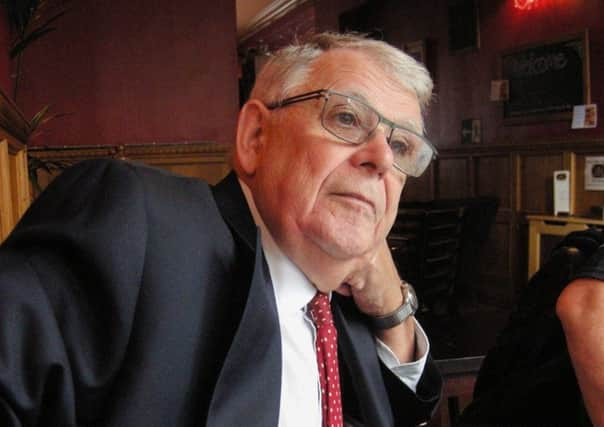Obituary: Nigel Wylde, QGM, army officer, IT expert


Lieutenant-Colonel Nigel Wylde was a former Cold War intelligence officer and weapons expert who, having served his country in Northern Ireland and on the front line of the Cold War gathering intelligence on Eastern Bloc forces, found himself charged with a breach of the Official Secrets Act for passing classified papers about surveillance operations in Northern Ireland to a journalist.
After a distinguished career, Wylde retired from the military intelligence in 1991 and became an IT consultant while continuing to advise official bodies on acts of terrorism. Wylde came into conflict with the authorities following the publication of The Irish War in 1998, written by journalist Tony Geraghty; the book, which described the growing use of computers by military intelligence in identifying targets, also raised issues about the indiscriminate surveillance of the Ulster population and included information about the security structure in the province.
Advertisement
Hide AdAdvertisement
Hide AdGeraghty had already been a thorn in the side of the Northern Ireland authorities during the Troubles, but the book provoked the ire of the Ministry of Defence and inquiries into the journalist’s activities followed. Wylde had been introduced to Geraghty by an army colleague and later Wylde agreed to help with the book. Shortly after publication, both men were arrested in dawn raids and charged under the Official Secrets Act for trafficking in classified information – secrets about classified surveillance computers used by the British military.
Geraghty’s book aroused official concern that intelligence-gathering methods would be compromised. However, the bugging of suspects’ houses, interception of telephone calls and e-mail, and concealed video cameras were already known to the IRA; only the monitoring of clothing by phoney dry-cleaning companies was perhaps a surprise.
Two years of anguish ensued, with both men protesting their innocence. All charges against Geraghty were eventually dropped, but not against Wylde, who was a government employee by virtue of an MoD contract. It was alleged that in 1997 and 1998 Wylde had made “damaging disclosures” under Section 2 of the act; he was accused of passing five documents to Geraghty. But, when it emerged that the information was already in the public domain, the Crown Prosecution Service’s case collapsed.
Wylde declared that, though it was “a victory for the freedom of speech,” the Ministry of Defence Police knew, or should have known from the evidence in their possession in December 1998, that no offence under the Official Secrets Act had been committed.
“Yet it has taken numerous letters to the Attorney General, Members of Parliament and many hundreds of thousands of pounds of taxpayers’ money for the prosecuting authorities to realise that they never had any evidence of wrongdoing.” he said.
Born in Rawalpindi, India, in 1947 (now Pakistan following independence), Nigel Wylde was the son of Norman, a Royal Signals officer, and his wife, Mary (née Higson). As a result, he was frequently moving with his father’s postings. From the age of nine, he was educated at the Duke of York’s Royal Military School, Dover, before progressing to the Royal Military Academy at Sandhurst, Surrey.
Commissioned into the Royal Army Ordnance Corps in 1968, he trained rigorously to become an ammunition technical officer. He was posted to Northern Ireland in 1974 where he commanded the Belfast 321EOD unit and was responsible for defusing more than 90 IRA devices in three months, including a 350lb car bomb, for which he was awarded the Queen’s Gallantry Medal. However, he raised concerns about possible army involvement in a murder in County Armagh and after “objecting very strongly” he was transferred back to England within a matter of days.
After completing a series of courses at the Army Staff College, Wylde became an intelligence officer and secured a marquee appointment as the weapons and munitions expert with BRIXMIS, the British Army of the Rhine Commander-in-Chief’s mission to the Commander of the Group of Soviet Forces in East Germany. Based in Potsdam, East Germany, at the height of the Cold War, Wylde was responsible for spotting new and unusual Russian weapons and equipment and, if possible, photographing them, often putting himself in highly perilous situations.
Advertisement
Hide AdAdvertisement
Hide AdOne coup was the acquisition of a new air-filtration unit fitted to a bunker, which, upon being sent to London, was found to be proof against a chemical agent the Russians were testing. He also studied the communications used by Soviet divisions stationed in East Germany and their encoding systems. A breakthrough he achieved during an extensive Soviet exercise allowed their signals traffic to be read as if clear for several months until the encoding settings were changed. With his sharp and inquisitive mind, he enjoyed the cat and mouse game offered by his Stasi and KGB counterparts.
After retiring, Wylde completed a postgraduate diploma in law and continued to provide expert opinion, some of which conflicted with official views, contradicting the findings of the Barron Report on the Dublin and Monaghan bombings before an Irish government subcommittee in 2004 and disputing the effectiveness of liquid explosives in the 2006 airline “terror plot”. He also worked in Citizens Advice, helping others to improve their lives.
Wylde died from pancreatic cancer. He is survived by his wife, Monika (Vogler), whom he married in 1970, and their daughter, Imina, and two grandchildren.